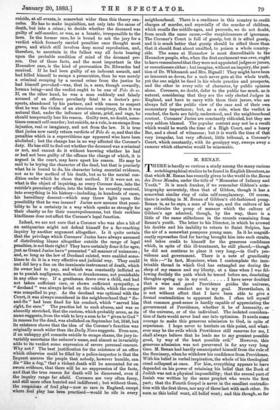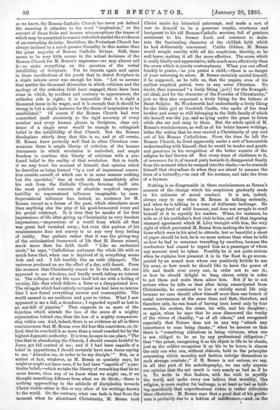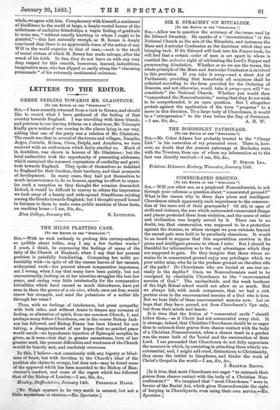M. RENAN.
THERE is hardly so curious a study among the many curious autobiographical studies to be found in English literature, as that which M. Renan has recently given to the world in the Revue des Deux Mendes, under the title of "Memories of Infancy and Youth." It is much franker, if we remember Gibbon's auto- biography accurately, than that of Gibbon, though it has ,a somewhat similar ring of calm self-complacency. Of course, there is nothing in M. Renan of Gibbon's old-fashioned pomp. Renan is, as he says, a man of his age, and the culture of his age ridicules the pomp of manner which the culture of Gibbon's age admired, though, by the way, there is a little of the same stiltedness in the records remaining from Renan's youth. The letter to his Director, in which he avowed his doubts and his inability to return to Saint Sulpice, has the air of a somewhat pompons young man. In it he magnifi- cently reproaches God for having brought him into such straits, and takes credit to himself for the generous confidence which, in spite of this ill-treatment, he still placed,—though he did not continue to place it very long,—in God's pro- vidence and government. There is a note of grandiosity in this :—" In fact, Monsieur, when I contemplate the inex- tricable thread in which God has entangled me during the sleep of my reason and my liberty, at a time when I was fol- lowing docilely the path which he traced before me, desolating thoughts spring up in my soul I have never doubted that a wise and good Providence guides the universe, guides me to conduct me to my goal. Nevertheless, it is not without effort that I have been able to give a formal contradiction to apparent facts. I often tell myself that common good-sense is hardly capable of appreciating the government of Providence, whether it be of humanity, or of the universe, or of the individual. The isolated considera- tion of facts would never lead one into optimism. It needs some courage to make this generous admission to God, in spite of experience. I hope never to hesitate on this point, and what- ever may be the evils which Providence still reserves for me, I shall always believe that he leads me to my greatest possible good, by way of the least possible evil." However, this generous admission was not persevered in for any very long time. M. Renan had hardly emancipated himself from the rule of the Seminary, when he withdrew his confidence from Providence. With his belief in verbal inspiration, the whole of his theological creed collapsed at once. For him, everything appears to have depended on his power of retaining his belief that the Book of Judith was not a physical impossibility; that the second part of Isaiah was written by the same prophet who wrote the first part; that the Fourth Gospel is never in the smallest contradic- tion with the first three, nor any of these last with each other. So soon as this belief went, all belief went; and this though, so far as we know, the Roman Catholic Church has never yet defined the meaning it attaches to the word "inspiration," or the amount of those finite and human misconceptions the traces of which may be permitted to remain embodied amidst the evidences of an overruling divinity. Doubtless, the Protestant Church has always inclined to a much greater liberality in this matter than the great majority of Roman Catholic divines. Still, there seems to be very little excuse in the actual decisions of the Roman Church for M. Renan's eagerness—we may almost call it—to stake everything on the question of the verbal infallibility of Scripture. -Yet he repeats again and again in these recollections of his youth that to detect Scripture in a single minute error was enough for him. " Let us assume that amidst the thousand skirmishes in which criticism and the apology of the orthodox faith have engaged, there have been some in which, by accident and contrary to appearances, the orthodox side is right; it is impossible that it is right a thousand times in its wager, and it• is enough that it should be wrong in but a single instance for the thesis of inspiration to be annihilated." Of course if the Roman Church had ever committed itself absolutely to the rigid accuracy of every number and every human phrase in Scripture, clear evi- dence of a single error would be enough to. extinguish belief in the infallibility of that Church. But the Roman theologians utterly deny that this is so, and at all events, M. Renan knew perfectly well that in other Christian com- munions there is ample liberty of criticism of the human documents in which revelation is embodied, and ample freedom to combine this liberty of criticism with a pro- found belief in the reality of that revelation. But in truth, if we may trust his account of himself, that opinion which lie describes as being formed "by a sort of impersonal concre- tion outside oneself, of which one is in some manner nothing but the spectator," was at work almost immediately after his exit from the Catholic Church, forming itself into the most polished concrete of absolute sceptical impene- trability to supernatural influence imaginable by man. Supernatural influence has, indeed, no existence for M. -Ronan, except as a dream of the past, which stimulates more than anything else the play of his good-humoured irony and -his genial contempt. It is true that he speaks of his first impressions of life after giving up Christianity as very desolate impressions,—impressions of a world from which all that was great had vanished away ; but even this portion of his reminiscences does not convey to us any very deep feeling of reality. One gathers rather that it was the giving-way of the ecclesiastical framework of life that M. Renan missed, much more than his faith itself. " Like an enchanted circle," he says," Catholicism embraces the whole life with so much force that, when one is deprived of it, everything seems Fade and sad. I felt terribly like an exile (dipays6). The universe produced on me the effect of a dry, cold desert. From the moment that Christianity ceased to be the truth, the rest appeared to me frivolous, and hardly worth taking an interest in. The collapse of my life upon itself left me with a feeling of vacuity, like that which follows a fever or a disappointed love. The struggle which had entirely occupied me had been so intense that I now found everything narrow and contemptible. The world seemed to me mediocre and poor in virtue. What I saw appeared to me a fall, a decadence ; I regarded myself as lost in an ant-hill of pigmies." That suggests to us more of the dejection which attends the loss of the sense of a mighty organisation behind one, than the loss of a mighty companion- ship within one. And, indeed, there is no evidence at all in these reminiscences that M. Renan ever did lose this conviction, or, in- deed, that he ever held it as more than a creed vouched for by the highest dogmatic authority. It is trne,he says in one place, " The idea that in abandoning the Church, I should remain faithful to Jesus, got fall control of me; and if I had been capable of a 'belief in apparitions, I should certainly have seen Jesus saying to me, ` Abandon me, in order to be my disciple." But, as a matter of fact, whatever, as M. Renan so quaintly says, he might or might not have seen, if he had been "capable of" a par- ticular belief,—which we take the liberty of remarking that he no more knows, than any of us know what we might see, if we thought something different from what we do think,—there is nothing approaching to the attitude of discipleship towards Christ visible either in this or any other of his writings known to the world. On the contrary, what one feels is that from the moment when he abandoned Christianity, M. Belau took Christ under his historical 'patronage, and made a sort of vow to himself to be a generous sceptic, courteous and benignant to his old Roman-Catholic masters, full of gracious sentiment to his former Lord, and constant to main- tain the fascinating character of the childish faith which he had deliberately renounced. Unlike Gibbon, M. Renan would mingle suavity with all his scepticism, thereby, as he well knew, making it all the more effective. The scorn which is really kindly and appreciative, tells much more effectively than the seorn which is purely contemptuous. When you can afford frankly to praise,—as you praise a child,—there is uo danger of your returning to adore. M. Renan certainly misled himself, if he supposed, as he tells us, that the papers, even of his earliest sceptical period, were in any sense Christian. No doubt, they expressed "a lively liking [goat] for the Evangeli- cal ideal, and for the character of the Founder of Christianity," just as they also expressed a lively liking for the fathers of Saint Sulpice. So Wordsworth had undoubtedly a lively liking for the little girl at Goodrich Castle, who spoke of her dead brother and sister as still belonging to the little family of which she herself was the joy, and as lying under the grass to listen while she sat and sang to them. But the whole spirit of M. Renan's reminiscences, as well as of his better known writings, belies the notion that he ever carried a Christianity of any sort out of his Roman Catholicism. From the time lie left the Roman Church, he lived apparently under a sort of honourable understanding with himself, that he would be tender and gentle and generous in his recognition of the better aspects of the religion he had thrown off. Bat every trace of obedience to it, of reverence for it, of inward piety towards it, disappeared finally from the moment when he escaped into the shade,—as he reminds himself that chrysalises do when they are about to assume the form of a butterfly,—to cast off his soutane, and take the dress of a layman.
Nothing is so disagreeable in these reminiscences as Renan's account of the change which his scepticism gradually made in his estimate of moral conduct. It is not, indeed, always easy to say when M. Renan is talking seriously, and when he is talking in a tone of deliberate badinage. He has a large fund of mild humour, and does not scruple to avail himself of it to mystify his readers. When, for instance, he tells us of his publisher's first visit to him, and of that imposing stamped agreement which M. Levy brought with him, the very sight of which prevented M. Renan from making the few sugges- tions which were in his mind to obtrude, lest so beautiful a sheet of paper should be lost, he is no more serious than when ho tells us how be had to renounce travelling by omnibus, because the conductors had ceased to regard him as a passenger of whom any account need be taken. Possibly he is not quite serious when he explains bow pleasant it is in the East to go accom- panied by an armed man whom one positively forbids to use his arms, or how much he should like to have the power of life and death over every one, in order not to use it; or how he should delight to keep slaves, solely in order to pet them and make them adore him. But if he is not serious when he tells us that after being emancipated from Christianity, he continued to live a strictly moral life only because no man should allow himself more than one breach of social convenances at the same time, and that, therefore, and therefore only, he can boast of having been loved only by four women, his mother, his sister, his wife, and his daughter; or again, when he says that he soon discovered the vanity of the virtue of chastity, " as of all others," and recognised especially that Nature does not in any way "attach any importance to man being chaste ; " when he assures us that there is "something ridiculous in being virtuous, when one is not obliged to be so by any professional obligation;" that "the priest, recognising it as his object in life to be chaste, jest as the soldier recognises it as his to be brave, is almost the only one who can, without ridicule, hold to the principles concerning which morality and fashion indulge themselves in such strange combats ;" if M. Return is not serious, we say, in all this part of his autobiography, we can only express our opinion that the net result is very nearly as bad as if he is. To write in this fashion, with the wish to mystify the world, and make every one believe that morality, like religion, is mere matter for badinage, is at least as bad as hold- ing specifically that unprofessional virtue is rather ridiculous than otherwise. M. Renan says that a good deal of his gentle- ness is probably due to a bottom of indifference,—and, on the whole, we agree with him. Complacency with himself, a sentiment of kindliness to the world at large, a deeply-rooted horror of the selfishness of exclu.sive friendships, a vague feeling of gratitude to some one, " without exactly knowing to whom I ought to be grateful,"—this last naturally enough, as M. Renan is deeply convinced that there is no appreciable trace of the action of any Will in the world superior to that of man,—such is the stock of moral virtues of which M. Renan has made salvage, after the wreck of his faith. In fine, they do not leave us with any very deep respect for this smooth, humorous, learned, industrious, imaginative man, who has slipped so easily along the " charming promenade " of his extremely sentimental existence.




































 Previous page
Previous page